Mental Health Stigma
Honoring Loss: Tribute to Former First Lady Rosalynn Carter
Setting the table for connection this season.
Posted December 16, 2023 Reviewed by Lybi Ma
Key points
- Last month the world lost a dear friend with the passing of former First Lady Rosalynn Carter.
- Our grief stands in front of an imagined future that will never be.
- Our best efforts might be to acknowledge the pain and work to live with what is now changed.
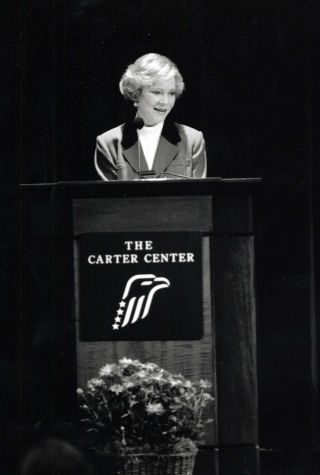
Who do you want to honor?
Last month the world lost a dear friend with the passing of former First Lady Mrs. Rosalynn Carter.
As we grieved, I struggled to understand loss: How does it show up? How can we cope with it? Can we move forward by honoring the loved one it has claimed?
Loss hits us at our core. It’s a deep inhale that hastens to the center of our being. Our feelings are informed by the finality, an inevitable departure.
Loss can be tinged with understandable regret. Not being present to say goodbye, and not sharing what one now understands would have been a last meal. Perhaps such thoughts are embedded in loss’s irrevocability. There’s always more we could have shared.
Our grief stands in front of an imagined future that will never be.
Loss is a bicultural experience that lives alongside parallel worlds. Around us, things carry on like always. We proceed with the normal, but inside we’re different, changed. We know a part of our lives will never be the same.
Society has ideas about how to manage loss: “It will get better.” “Time will heal.” These thoughts might be true. Responses I’ve certainly said in futile attempts to console a grieving loved one.
But maybe they’re not. Maybe no one can dictate how we’re going to feel about a loss.
Not even us.
The reality is, we might never get over a loss. Our best efforts might be to acknowledge the pain and work to live with what has now changed. Perhaps that’s where honor comes in.
I first learned of the Rosalynn Carter Fellowships for Mental Health Journalism when Mrs. Carter was speaking at a Georgetown Training Institute in July 2002. It was wonderful to hear about resources provided by the Fellowship to support the reporting of critical mental health issues among journalists. The ethos of the fellowship reflects Mrs. Carter’s commitment to mental health as a human right. In 2004, I was fortunate to be among 10 incoming fellows, writing in Spanish for Hoy (Newsday in Spanish) about the stigma of mental illness within Latinx communities.
Our family developed a relationship with Mrs. Carter. She loved to dine where my husband Julian was a chef. In anticipation of one of her visits to New York, Sabrina, age 6 (then known as Beanie), and big sister Izzy, age 8, made artwork for Mrs. Carter.
Beanie, who loved drawing with different colors, painstakingly wrote a card using a different colored magic marker for each letter.
“Beanie, the FBI is going to show up at our house after you send that card,” I said in a proud, joking way. She had just learned how to write all her letters.
Six-year-old Beanie (now 18-year-old Sabrina), looked at me and asked, “What’s Mrs. Carter’s favorite color?”
“I’m not sure,” I said.
“Well, I’m going to share my favorite color with her,” Beanie said, “It’s rainbow.”
A couple weeks later a letter arrived in the mail. It was from Mrs. Carter.
In it, she said, “Please tell the girls how much I like their artwork. Since it has always been difficult for me to decide what color I prefer, I especially appreciate their introducing me to rainbow, which is now my favorite.”
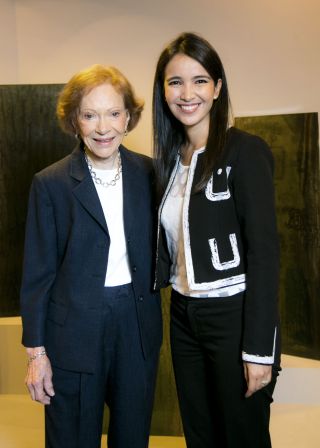
In 2011, it was humbling to be invited to join Mrs. Carter’s Fellowship Advisory Board. A goal was to support The Carter Center’s Mental Health Program, led by former director Dr. Thomas Bornemann and former associate director of the Rosalynn Carter Fellowships for Mental Health Journalism, Rebecca Palpant Shimkets, to find a country partner to expand to Latin America. States Palpant Shimkets, “Colombia became a place of interest for the fellowship in 2012 after significant discussions with Carter Center Americas Program colleagues, who were engaged in post-conflict peace work within the country. Mental health issues were identified as a significant public health problem and the stigma associated with mental illnesses as a barrier to help-seeking for many Colombians.”
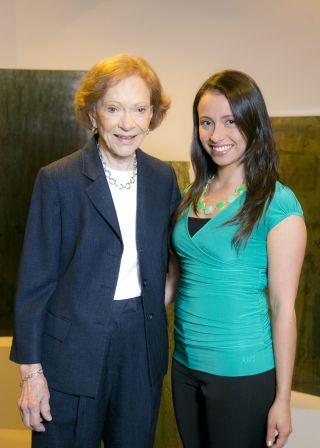
Mrs. Carter was passionate about bringing people together. Extending the fellowship program to Colombia provided information to many who had experienced decades of armed conflict resulting in high levels of trauma. Since 2019, the program has extended across Latin America and includes fellows from Mexico, Brazil, Costa Rica, Argentina, and Perú. The GABO Foundation, founded by Gabriel García Márquez, has played a significant role in this transnational outreach as well.
The weekend after Mrs. Carter’s tribute service, I felt an urgent need to drive out to see my Dad, who turns 95 next month. In the face of loss, it was important to engage in the everyday activity of having dinner with a loved one, setting the table for connection, so to speak.
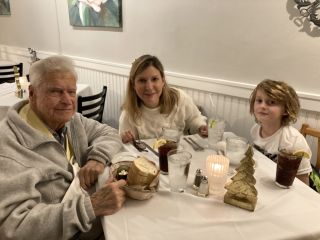
And there we were, at my late mom’s favorite restaurant a few hours later; Dad insisting he wasn’t hungry despite he and 7-year-old grandson Olliver fighting over who would get the last of the popcorn shrimp.
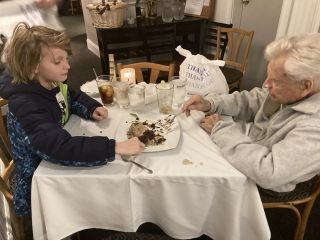
Then things escalated when the brownie fudge sundae appeared; all the more coveted as it was on the house, with Dad and Olliver working their spoons like swords to see who could get the best brownie bits.
Maybe one way to deal with loss is to honor it.
To meet it face to face and say (or scream, or whisper), “We honor you.”
We honor you because that’s what we do for those we love. We honor you because we can put into action the things our loved one cared about.
In the documentary Following Inspiration: A Conversation with Former First Lady Rosalynn Carter, Mrs. Carter says: “I think that stigma is beginning to move. We’re not going to be through it, we have a long way to go, but I think it’s beginning faster than I ever thought it would. And particularly among young people. I’m hopeful for the future.”
Mrs. Carter may no longer be with us physically, but her impact and expansive legacy continue to inform us as we aspire to honor her through our actions.
Just as Mrs. Carter outstretched her arms and embraced the whole world.
Who do you want to honor?
If you are experiencing a loss and would like to speak with a mental health professional, Psychology Today is a national tool for finding a therapist.
References
Universidad de La Sabana in Colombia was selected to administer the fellowship program under the leadership of Drs. Víctor García Perdomo and Yahira Guzmán. The first Colombian fellows were selected in 2013 with Silvia Camargo Abello and María Cristina Castro Pinzón writing about the mental health impact of armed conflict within Colombia and Fernanda Hernández Martínez and Paula Andrea Bedoya Sánchez focusing on challenges in the prevention, diagnosis, and treatment of depression within Colombia.
Clauss-Ehlers, J.C.E., & Clauss-Ehlers, C.S. (2022). Eating together being together: Recipes, activities, and advice from a chef dad and psychologist mom. Princeton Architectural Press.




